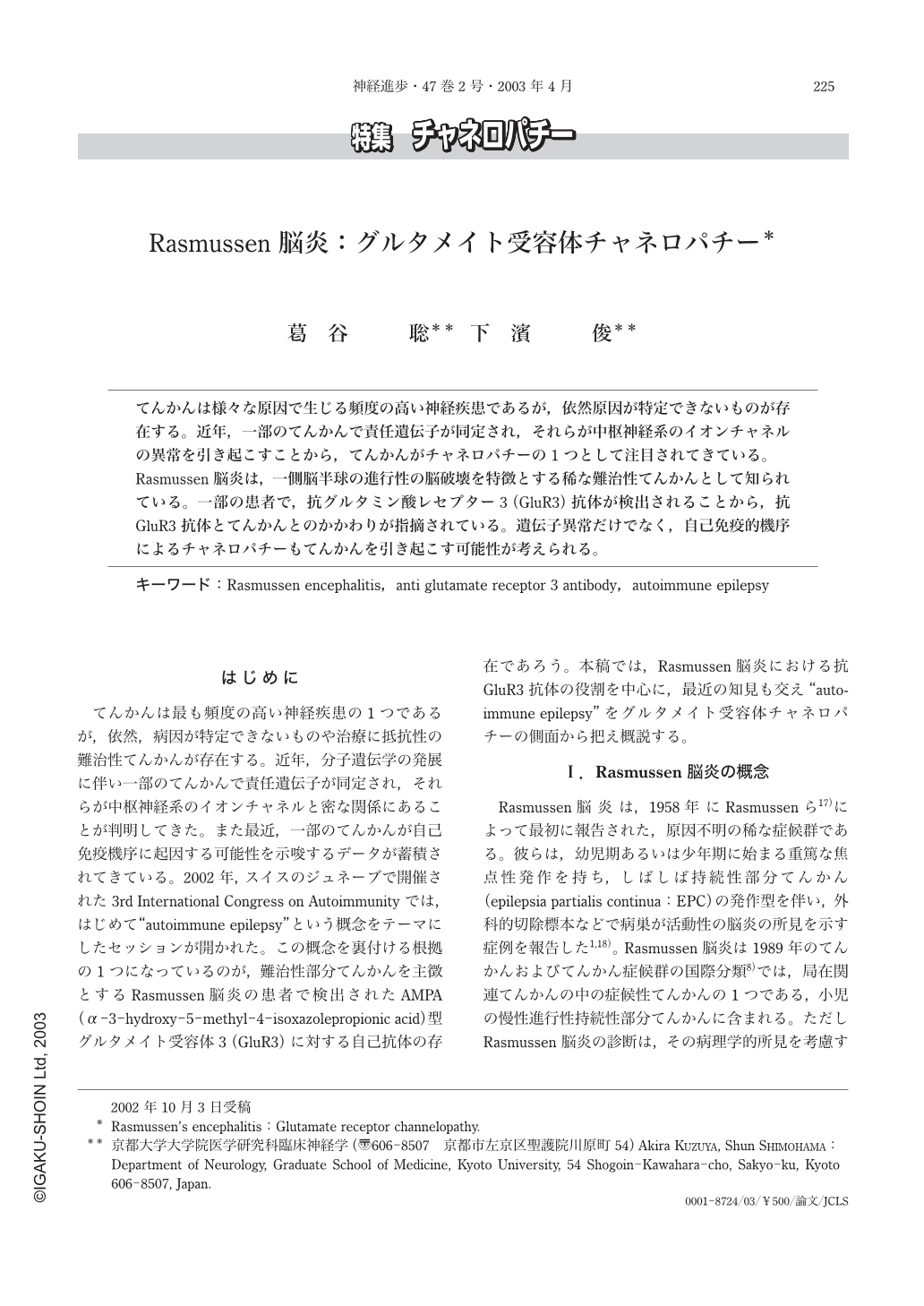Japanese
English
- 有料閲覧
- Abstract 文献概要
- 1ページ目 Look Inside
てんかんは様々な原因で生じる頻度の高い神経疾患であるが,依然原因が特定できないものが存在する。近年,一部のてんかんで責任遺伝子が同定され,それらが中枢神経系のイオンチャネルの異常を引き起こすことから,てんかんがチャネロパチーの1つとして注目されてきている。
Rasmussen脳炎は,一側脳半球の進行性の脳破壊を特徴とする稀な難治性てんかんとして知られている。一部の患者で,抗グルタミン酸レセプター3(GluR3)抗体が検出されることから,抗GluR3抗体とてんかんとのかかわりが指摘されている。遺伝子異常だけでなく,自己免疫的機序によるチャネロパチーもてんかんを引き起こす可能性が考えられる。
はじめに
てんかんは最も頻度の高い神経疾患の1つであるが,依然,病因が特定できないものや治療に抵抗性の難治性てんかんが存在する。近年,分子遺伝学の発展に伴い一部のてんかんで責任遺伝子が同定され,それらが中枢神経系のイオンチャネルと密な関係にあることが判明してきた。また最近,一部のてんかんが自己免疫機序に起因する可能性を示唆するデータが蓄積されてきている。2002年,スイスのジュネーブで開催された3rd International Congress on Autoimmunityでは,はじめて“autoimmune epilepsy”という概念をテーマにしたセッションが開かれた。この概念を裏付ける根拠の1つになっているのが,難治性部分てんかんを主徴とするRasmussen脳炎の患者で検出されたAMPA(α-3-hydroxy-5-methyl-4-isoxazolepropionic acid)型グルタメイト受容体3(GluR3)に対する自己抗体の存在であろう。本稿では,Rasmussen脳炎における抗GluR3抗体の役割を中心に,最近の知見も交え“autoimmune epilepsy”をグルタメイト受容体チャネロパチーの側面から把え概説する。
Epilepsy is one of the most frequent neurological diseases, which is caused by various etiology, but some with completely unkown etiology. Recently, the responsible genes have been identified in some types of epilepsy, and it has been demonstrated that they are involved in the abnormality of ion channels in the central nervous system(CNS). And so, epilepsy, in part, has been recently considered as“channelopathy”, which is the disorder caused by the dysfunction of channels.
Rasmussen's encephalitis is kown as a rare type of epilepsy characterized by progressive destruction of a single cerebral hemisphere. The disease typically starts in the first 10 years of life and is characterized by partial seizures, which often are unresponsive to anti-epileptic drugs, and progressive hemiplegia secondary to focal cortical inflammation and tissue destruction. The underlying histopathology consists of perivascular lymphocytic cuffing, microglial nodules, neuronal loss, and gliosis.In recent years, evidence has mounted that Rasmussen's encephalitis may be caused, at least in part, by an autoimmune attack of antibodies to the glutamate receptor of theα-amino-3-hydroxy-5-methyl-isoxazole-4-propionic acid(AMPA)subtype, GluR3. In addition to anti-GluR3 antibodies, recent reports have suggested an early involvement of autoimmune cytotoxic T lymphocytes in the pathogenesis of the disease. These data suggest that autoimmune system, especially against ion channels of the CNS, may be involved in the pathogenesis of some forms of epilepsy, although it remains unclear whether the activation of the immune system is primary or not.

Copyright © 2003, Igaku-Shoin Ltd. All rights reserved.


